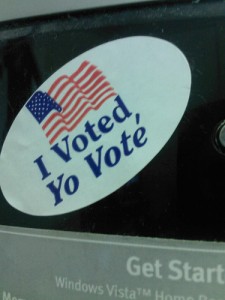How Latinos Hold The Key To The 2010 Presidential Election
[Editor’s note: This was written by Dr. Henry Flores, professor of Political Science and Dean of the Graduate School at St. Mary’s University, in San Antonio, Texas. He is a regular contributor to News Taco, and you can read more of his biography below.]
The last time I posted in this space I was discussing how Latinos had the potential of being game changers. Simply put the rapid growth of Latinos over the last ten years has changed the face of the electorate in many states. One of the most interesting aspects of this phenomenon is that approximately 90% of all Latino registered voters live in only 15 states. These 15 states account for 294 Electoral College votes and it only takes 270 of these votes to elect the President of the United States.
Pause Here!
Did you just hear what I said? Ninety percent of Latino registered voters, not Latinos, not Latino citizens, Latino registered voters, live in states that control 294 Electoral College votes! This means that Latinos have the potential to elect the President of the United States! Think about that for just one moment.
We have the potential of electing the President of the United States!
Can you imagine that? Just a few decades ago, when I was a little kid, this would have been an unheard of thought. If you look at the list of states and see how President Obama did you will find that he won 13 of the 15 states. It was clear that Latinos delivered victories for the president in four of those states. In many others Latinos, in combination with African American voters and liberal white voters provided the president with his victory edge.
¡Imaginete! We have become the politically most important group of voters in the country because any candidate who wants to be elected president needs our votes. Layered on top of this situation is the notion that everyday a new cohort of 18 year old Latinos enters the electorate. By the time the 2012 elections come around we will become an even more powerful group of voters.
Can you imagine (we’re doing a great deal of that today) what our voice means to the public policy process. We can make politicians pay attention to us on education, health care, immigration, and foreign policy issues. We can change the game in the United States so dramatically that other countries will be concerned with what Latinos are thinking about when it comes to public policy. Actually, this is already the case because academics and governments throughout Europe and Latin America are already gathering data on how US Latinos think about politics.
So, gente, take yourselves seriously politically and get out there and change the game! Change who is in office; perhaps elect a Latino to the presidency.
[Photo by College Park Speed and the…]Henry Flores, Ph.D., is a Professor of Political Science and Dean of the Graduate School at St. Mary’s University. Dr. Flores has served as the departmental chairperson for two terms and directed both Graduate Programs in Public Administration and Political Science. He has taught classes at both the graduate and undergraduate levels in public administration, public policy, urban politics, and research methods and statistics.
Since 1986, Dr. Flores has served as an expert witness in more than 50 federal voting and civil rights lawsuits including serving as the statistical testifying expert in NAACP v. Harris which focused on the presidential challenge in Florida in 2000. Dr. Flores has been active with many community-based organizations such as COPS, Metro Alliance in San Antonio, LULAC, NAACP, MALDEF, the Southwest Voter Registration and Education Project, and the Esperanza Environmental Justice Project. During state redistricting efforts in 2001, he was a senior policy analyst with the William C. Velasquez Research Institute, providing research on the racially polarized nature of the Texas electorate.
Dr. Flores is the author of “The Evolution of the Liberal Democratic State With a Case Study of Latinos in San Antonio, Texas” (2003) and coauthor of “Mexican Americans and the Law” (2004) with three other colleagues.


